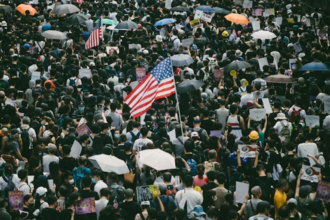The Zohran Mamdani mayoral campaign in the New York City mayor’s race advocated radical policies, an unashamed attitude toward wealth inequality, and an attempt at systemic change in the city. Mamdani has branded himself as an advocate of working-class citizens, demanding that the way in which the city addresses housing, taxes, and services be altered monumentally, following a surprise win in the Democratic primary.
- What are Zohran Mamdani’s economic equity propositions?
- What is the reasoning behind the focus on richer neighborhoods?
- Is Zohran Mamdani a democratic socialist or a communist?
- Why is the campaign by Mamdani important in history?
- What does Mamdani think about foreign policy matters?
- What has been Mamdani’s response to the criticism from political opponents?
- How would the action of the policies raised by Mamdani affect NYC?
- What led to the win of Mamdani during the primary election?
- Final Thoughts
Universal childcare and taxing richer neighborhoods, through initiatives led by Mamdani, are rewriting the story of what can and can not be offered in local governments. With the general election round the corner, both voters and policymakers are paying close attention to how this progressive vision would be materialized.
What are Zohran Mamdani’s economic equity propositions?
Economic justice is one of the pillars of his platform as a Zohran Mamdani mayoral candidate. His ideas include raising taxes paid by the richest 1 percent of New York residents to finance big-budget programs. Among them are free buses, city-owned groceries, universal childcare, and a minimum wage of $30 an hour.
He also wants to implement a rent freeze in the city and points out that current prices are too high even for an average family. Instead of billionaires being an inevitable component of the economy, Mamdani has raised doubts about the existence of billionairesses themselves with extreme wealth as being out of line since there is a huge problem of poverty in the city. He writes that there should not be billionaires in the era of such inequality. Here is the link to our article on NYC Primary Shock
What is the reasoning behind the focus on richer neighborhoods?
Another big campaign plank of Mamdani is to reorganize the property taxing regime in the city. He will suggest moving the burden to better homes, especially those that are richer and whiter. According to him, it is a way that straightens out imbalances in the system and focuses on groups based on race.
Indeed, when asked about it, Mamdani explained that he simply aims to describe things as they are, that is, the inequality in the real estate, which profits wealthy spaces at the expense of underfunding the marginalized neighborhoods. Despite his proposal facing criticism, he argues that a fair tax is required for the provision of the much-needed services in the city.
Is Zohran Mamdani a democratic socialist or a communist?
Mamdani is a democratic socialist who shares his policy objectives but not with Communism. He has denied the claims and especially those by former President Donald Trump that he is a communist. Rather, he focuses on policies that will be used to enhance the economic and social situation without being a complete denial of the market systems.
He said that any finger-pointing towards his appearance, background, or political inclinations is just a distraction from the matters he is bringing to the table. According to him, his agenda is to transform the lives of the common people of New York by providing them with easy accommodation, transport, and decent pay. Here is the link to our article on Mamdani Shakes NYC
Why is the campaign by Mamdani important in history?
Zohran Mamdani, mayor, would be the first Muslim and Indian American to become the mayor of New York City in case he is voted into power. The development marks a change in political balance in the city and extends the pollution of the city leadership.
His background and identification have penetrated his platform with a focus on equity, inclusiveness, and empowering the community. The election of Mamdani will be a departure in conventional politics because he will provide voters with an entirely new vision influenced by activism on the grassroots and direct interactions.
What does Mamdani think about foreign policy matters?
Although the leaders at the municipal level are geared towards local matters, it has come to the point where Mamdani has made previous remarks relating to the Israel and Gaza conflict that have evoked the country at a national level. He has been emphasizing the Palestinian human rights and called certain actions of the Israeli forces as genocide,e- which has been disputed by many.
When he was asked about whether he supports such slogans as globalise the intifada, Mamdani explained that it is not a language he speaks, but he knew about the call of justice and equality, not violence. He has also criticized what he considers to be an excess of government action against pro-Palestinian activists in the U.S.
What has been Mamdani’s response to the criticism from political opponents?
With scrutiny, Mamdani has been very calm and has often contributed criticism, which helps in making the gravity of his platform important. Be it the wealthy elites opposing him or political leaders declaring him radical, he turns such incidents into a scenery, where he shifts the discussion to areas such as poverty, housing, and health.
He observes that to divert attention away from economic inequalities and dissatisfaction, personal attacks are usually employed. With the Zohran Mamdani mayor campaign gaining momentum, he has hit back at his critics twice as hard with his claims of transparency and accountability.
How would the action of the policies raised by Mamdani affect NYC?
The proposals given by Mamdani have the potential to radically change the balance in New York in terms of public spending and urban planning. The increased taxes on the rich, when implemented, would enable long-term investment, childcare, transportation, and food security. Each of these plans, however, would require legislative authorization in the state and a signature of the governor; political negotiation would be vital.
According to his critics, this could scare away the rich income earners. Mamdani, however, asserts that the aim is not to penalize wealth, but ratheto r to make it play a more fair-minded role in society. The vision has appealed to voters who have been left behind over decades of policymaking by the status quo.
What led to the win of Mamdani during the primary election?
A vigorous grassroots campaign was an important factor attributed to the major win of Mamdani. By putting an emphasis on affordability and fairness of the system, he conquered a tough rival, who was the former Governor Andrew Cuomo. He reached a wide audience of youthful voters, blue-collar citizens, and voters who were tired of the procrastination within the political system.
The Zohran Mamdani mayoral campaign was able to mobilise communities in the five boroughs through door-to-door canvassing and town halls, as well as through social media outreach. His victory in the primary has turned him from a political outsider to a powerhouse going into the general race.
Final Thoughts
The Zohran Mamdani mayor campaign is not a simple electoral race- probably the most important challenge to the economy and social base of New York City. The demand to change the tax system to tax the richest people, invest in key government services, and promote representation has built a massive coalition of people eager to vote Mamdani into the Presidential office. His candidacy that accompanies the hover of the general election has the potential to transform not only the leadership of the city, but also the values, priorities, and future of the city.








